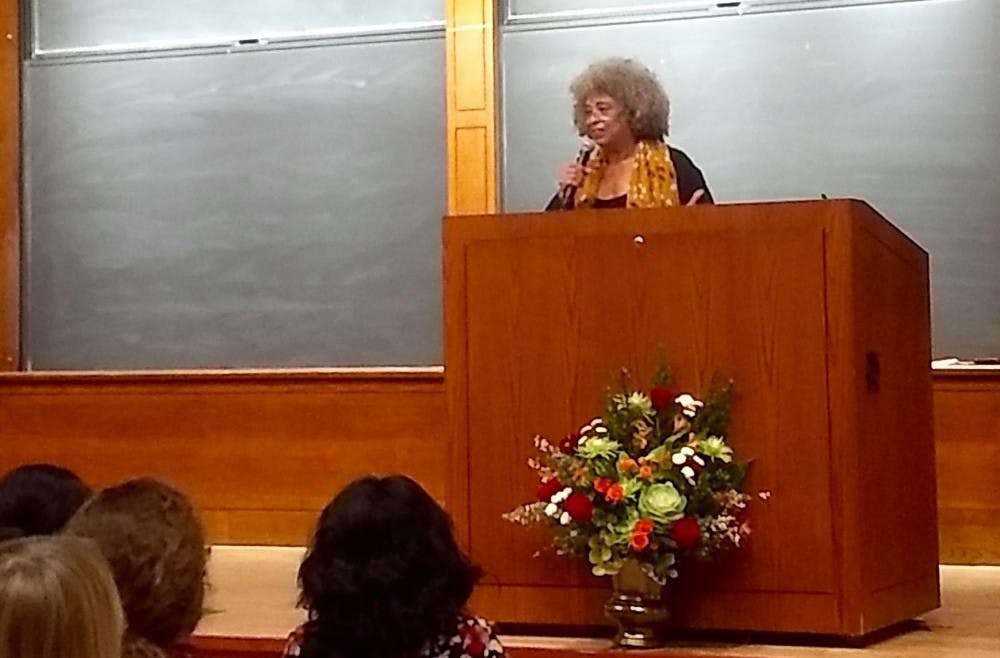For radical activist Angela Davis, Ph.D., the criminal justice system and capitalism are one and the same.
In a fiery lecture hosted by the Whig-Cliosophic Society, Davis — two-time Communist Party USA Vice-Presidential candidate and former FBI 10 Most Wanted fugitive — spoke about her activism around social equality and her experience in the California criminal justice system.
Thursday’s talk represented the third occasion in as many years in which Davis has spoken on campus.
After a brief introduction from Whig-Clio co-presidents Lena Hu ’19 and Justin Wittekind ’21, Davis took the stage to a standing ovation, remarking on the demographic make-up of the crowd.
In the 1950’s, “a gathering such as this would have been impossible,” she said, “especially at Princeton University.”
The election of Donald Trump in 2016, according to Davis, was “an unexpected low” for those who “wished for a better future.”
“I don’t know a single event that created such a collective despondency,” she said.
Still, she said the election was only one of many events fraught with racial injustice throughout U.S. history — a “history of broken promises.” In fact, she noted, it was former alumnus James Madison who negotiated the Three-Fifths Compromise.

“He was the founder of the Whig party, correct?” she asked, pointing to Hu and Wittekind in the audience.
During the second half of the lecture, she spoke about her childhood in Birmingham and how it ultimately convinced her to become an activist.
She recalled a story about how her neighbors were firebombed by the Ku Klux Klan. She heard the explosion while she was cleaning her shoes for Sunday school.
“People sometimes ask me why I became an activist,” she said. “I tell them I had no choice, unless I thought of myself as inferior.”

Nevertheless, Davis and her brand of activism have infamously generated controversy. While a professor at UCLA, almost daily anonymous death threats convinced her to buy several guns. Fellow activist Jonathan Jackson stole her guns, taking a local courthouse hostage, eventually resulting in four deaths.
She was charged with kidnapping and conspiracy to commit first-degree murder, provoking protesters worldwide to demand her release from prison, and she was later acquitted.
Nevertheless, she claims that it was only because of her ties to the Communist Party that the “holy triumvirate” of Richard Nixon, J. Edgar Hoover, and then-California Governor Ronald Reagan attempted so adamantly to imprison her.
Even now, she maintains her Communist beliefs, arguing that “prison as a form of punishment is directly connected to capitalism.”
“Sometimes we think we can speak about racism separately from capitalism,” she said. “But because of the impulses to build capital through slavery and colonialism, people all over the world suffer from the burden of capitalism today.”
She repeated this sentiment during the Q&A section.
In response to an audience member’s request that Davis speak directly to the economics majors in the room, the activist responded that they should read Karl Marx’s “Das Kapital.”
Finally, she ended the lecture with an impassioned defense of the “Boycott, Divest, Sanction” movement, a controversial political movement founded 13 years ago that has taken on an increasingly messy role in the Israel-Palestine conflict, according to The Guardian.
“I’m surprised that politicians have convinced so many people to equate the struggle for Palestine as a form of anti-Semitism,” she said, to audience applause.
Audience member Zeytun West ’22 thought that Davis was “wonderful” and had “great ideas.”
West is a staff photographer for The Daily Princetonian.
“I find that people really pay attention to her when she speaks,” West said. “When she took a break to gather her thoughts, the room was silent. Everybody was hanging on her last word.”
The lecture was held in McCosh 50 at 5:30 p.m. on Dec. 13. It was co-sponsored by the Whig-Cliosophic Society, Women*s Center, the Office of the Dean of Undergraduate Students (ODUS), the Carl A. Fields Center, the Pace Center, the LGBT Center, the Undergraduate Student Government (USG) Projects Board, the Program in Gender and Sexuality Studies, the Wilson School, the Department of African American Studies, and the Department of Politics.








